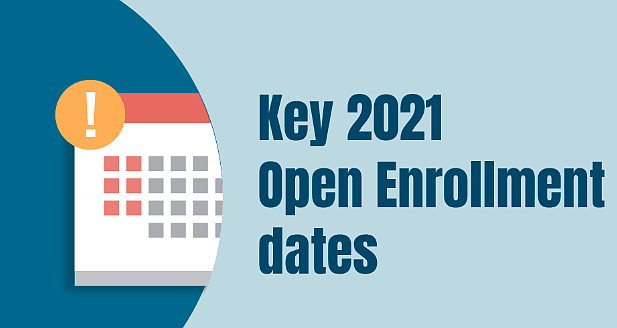- April 26, 2024
-
-
Loading

Loading

It’s that time of year when the air is cooler at night, the leaves are showing hints of yellow and the sounds of fall sports are heard around the community.
It also means it’s time for health care open enrollment.
Open enrollment is the yearly period when people can enroll in a health insurance plan for the upcoming year. They are eligible if they have certain life events, like getting married, having a baby or losing other health coverage. Job-based plans might have different open enrollment periods.
Enrollment plans are crucial to discourage adverse selection, which happens when sick people sign up for health insurance but healthy people don't.
Open enrollment for 2021 runs Sunday, Nov. 1, through Tuesday, Dec. 15. Starting Nov. 1, people can log in to HealthCare.gov, fill out an application and enroll in a 2021 Marketplace health plan.
Coverage starts Jan. 1, 2021. The new plans and prices will be available to preview shortly before Nov. 1.
Looking for the right coverage for you or your family can be daunting, but Jessie Nelson, corporate director of benefits for Orlando Health Human Resources, provided tips on navigating the often-confusing world of health insurance. She said it’s important to review all the available options — through one’s employer, a spouse or parent’s plan, and Marketplace.
“General speaking, an employer plan is generally better than anything you could purchase independently,” Nelson said. “Employers usually subsidize part of the plan … versus if you go and buy something on the open market. … You can’t negotiate because you are one.”
Plans sometimes change year to year, and people need to know whether the plan is active or passive, whether the coverage is broad or narrow and whether the right doctors for them are included.
“Look at your payroll deductions,” Nelson said. “Some folks will say, ‘I want the best plan,’ (but) that varies with each person. They might say, ‘I want the least deductible,’ but (that) might not be it here.”
Another important factor for people making insurance decisions is knowing the maximum amount of money they would be responsible for, she said.
“Within PPO or HMO plans, every individual on the plan has their own out of pocket and deductible,” Nelson said. “In some high-deductible plans, all of the family’s expenses count together toward that maximum deductible.”
Knowing the drug coverage is important, too, she said.
There is a difference between flexible savings accounts and health savings accounts, too, Nelson said. Both are tax-advantaged savings accounts that allowed the insured to pay for qualified medical expenses with pretax funds, but they differ in who is eligible to enroll and when savings expire.
Many employers will offer dental, vision, short- or long-term disability coverage and discounts on things such as cell phones or pet or auto insurance.
“Folks miss those,” Nelson said. “People don’t realize those fun little perks or little extra benefits are available and they can give you more take-home pay.”
She said it’s important to review one’s life insurance policy annually — making any necessary updates to beneficiaries — and looking over his or her retirement plan.
“You’ll want to know where your retirement is going to,” she said. “And look for an employer match; make sure there’s nothing left on the table.”
THE YEAR OF COVID
Nelson said rates are increasing an average of 4.4% next year.
“Employers are looking at the impact we’re seeing from COVID,” she said. “Employers are seeing an increase in COVID claims.”
At the same time, she said, other claims have decreased this year. When the coronavirus reached the United States in the spring, people scaled back on scheduling as many elective surgeries or using other discretionary services.
All of this has an impact on health insurance in 2021.
Nelson said she is starting to see the number of claims nearing pre-COVID-19 levels.
The government has passed legislation regarding the coronavirus, so employers are seeing those changes — including COVID-19 testing at no cost —in insurance options as well.
It’s up to each employer to determine what he or she feels is in the best interest of their employees. People also have options when it comes to shopping around and comparing insurance plans to make sure they are getting what’s best for them and their family.